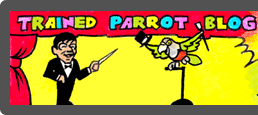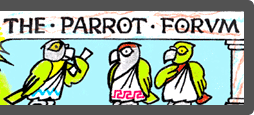 by Pajarita » Fri Jan 15, 2021 11:43 am
by Pajarita » Fri Jan 15, 2021 11:43 am
Hi, Ritter, welcome to the forum and thank you for taking on the huge responsibility and long commitment of caring for parrots.
Now, two weeks is nothing when it comes to a parrot adjusting to a new home - much less a new human. The recommended protocol is to let them be on their own for the first two weeks (no asking for step-up, no putting your hand in the cage, not even coming out of the cage) because they need that time to get used to the sight, smells, noises, schedules and routines of the new home and the best way to do this is to start them off the right way: strict solar schedule, crepuscular feeding, right diet (no free-feeding any protein food, raw produce, etc) and, most of all, stick to the same exact daily routine.
Once the two or three weeks are up, you start by opening the door to the cage and walking away at dawn (no artificial light on). Once the bird leaves the cage, you clean it and put out fresh raw produce. Then, when the two hours of twilight without artificial lights are up, you put out grain breakfast (I recommend gloop and raw produce). For the next following weeks, you should play it by ear, observing the bird's actions and reactions to figure out if and when the bird wants to take a step to a closer relationship with you - things like the bird eagerly waiting for your presence, moving closer to you, flying to you, etc. You should talk, sing, whistle, dance, etc to the bird and, every now and then (but not all day long, no more than 3 or 4 times a day, and never before its meal), you offer a small treat -something like a piece of a nut, my Senegals' high value item is cashews for both of them and, after cashews, English walnuts but you would have to figure out which nut is yours high value item to use as a special treat.
Now, as to the bird being exposed to smoke... well, you did not say how long this had been going on but, if this went on for a few years, I can assure you that these birds have lung damage already and, unfortunately, because birds' respiratory system is completely different from ours, those lungs might never be completely clean (birds cannot cough so the 'bad' stuff cannot be 'coughed up') so you are going to have to be VERY diligent on making sure they get clean, fresh, moist oxygen rich air all the time. I am talking a large (it has to be larger than what is recommended for the size of the room where they are) and powerful air purifier always on in the room where they are kept, a humidifier during all the cold weather months and opening a window a crack so there is always fresh air coming in and replacing the 'dirty' air. This might sound like a lot to anybody who did not have birds before but it's actually pretty standard for bird care - I don't have birds with damaged lungs but I still have both a humidifier and an air purifier for mine and there is is a window crack open 24/7/365 on each floor of my house even on the coldest of days). Is the bird going through nicotine withdrawal? Hmmmm, I don't think so. Mind you, I am not arguing that the birds did have nicotine in their bloodstream but it takes about 3 days for a human to get rid of it and you've had these birds for two weeks already so, although I do believe that it took longer for them because they are caged (bad 'things' in the bloodstream can only be eliminated through exercise and the only exercise birds have is flying, nothing else), I am sure that the nicotine has already disappeared from their bodies. It's the tar that stays in the lungs that is the problem here because birds do not have phlegm to cleanse them out and, even if they did, they cannot 'cough it up'.
The birds are now on what we call 'the honeymoon period' which means they are on their best behavior (kind of fading into the woodwork) while they figure out whether the unfamiliar environment is dangerous or not (this normally lasts about 2 to 3 months). Usually, birds gradually feel more at home and start moving around more as well as making more noises so Danny's behavior is atypical in that, going by your post, he is going 'backwards' instead of forward but if you started trying to interact with him too soon this might be his way of telling you that he needs more time to figure things out on his own. But it can also mean that he is sick - let me explain. The bare minimum requirements are 4 hours of out of cage and 1 hour of one-on-one but, if you ask me, this is not enough for Senegals. Senegals are not only highly intelligent, they also bond very deeply and, because of this, they require much more personal attention than other species so the half an hour to one hour a day you've been spending with him is not going to be anywhere near enough for him in the future. The reason why sickness is a very distinct possibility is that pet birds are VERY prone to respiratory infections due to bad diet (you did not say what the bird was eating before or what you are feeding it now but if they don't get enough betacarotene for sufficient vit A production their respiratory system suffers) and not enough flight (when birds don't fly, their respiratory system atrophies and an atrophied organ is very prone to infection). If you add the cigarette smoke to this AND the stress of being moved to a new home, you have a very distinct possibility that the bird is sick.
My recommendation to you is that you re-evaluate his diet immediately and observe him very carefully for any other symptoms for the next 24 hours: lethargy, fluffed up during the day, lack of appetite, discharge (from nares -nostrils- or eyes), sneezes, tail bob or chest visibly pumping when in repose, weakness in flight, etc - and, if you see any, take him to the vet immediately (and I do mean immediately because there is not time to waste with sick birds) as he is going to need antibiotics and/or antifungal (the other real bad thing they get with stress, bad diet and bad lungs is aspergillosis because the pathogen is EVERYWHERE and it is only through a strong and healthy immune system that they don't get infected so weak immune system = aspergillosis).
Let me know if there is anything more that I can help with.




